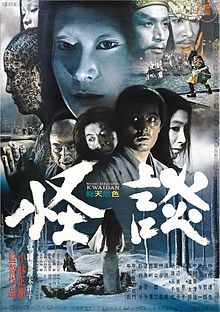- Kwaidan (film)
-
Kwaidan 
Directed by Masaki Kobayashi Produced by Shigeru Wakatsuki Written by Lafcadio Hearn
Yôko MizukiStarring Rentaro Mikuni
Keiko Kishi
Michiyo Aratama
Misako Watanabe
Tatsuya NakadaiMusic by Tôru Takemitsu Cinematography Yoshio Miyajima Distributed by Toho Company Ltd. Release date(s) December 29, 1964 Running time 183 minutes Country Japan Language Japanese Kwaidan (怪談 Kaidan) is a 1964 Japanese portmanteau film directed by Masaki Kobayashi; the title means 'ghost story'. It is based on stories from Lafcadio Hearn's collections of Japanese folk tales. The film consists of four separate and unrelated stories. Kwaidan is the archaic transliteration of Kaidan, meaning "ghost story". It won the Special Jury Prize at the 1965 Cannes Film Festival[1], and received an Academy Award nomination for Best Foreign Language Film.[2]
Contents
The four stories
"The Black Hair" was adapted from "The Reconciliation", which appeared in Hearn's collection Shadowings (1900). A man living in Kyoto divorces his wife, a weaver, for another woman, in order to attain greater social status. The marriage is unhappy, and his wife expels him from their home. He returns to his first wife, who readily accepts him, but later he discovers her to be no more than clothing, hair and a skull.
"The Woman of the Snow" is adapted from Hearn's Kwaidan: Stories and Studies of Strange Things (1903). It depicts the folkloric character of Yuki-onna, a ghostly female figure who inhabits snowy regions.
"Hoichi the Earless" is also adapted from Hearn's Kwaidan (though it incorporates aspects of The Tale of the Heike that are mentioned, but never translated, in Hearn's book). It depicts the folkloric tale of Hoichi the Earless, a blind musician, or biwa hoshi, whose specialty is singing the The Tale of the Heike, about the Battle of Dan-no-ura, a war fought between Emperor Antoku and Minamoto no Yoritomo during the last phase of the Genpei War. Hoichi eventually finds himself singing to the ghosts of the very heroes that are the subject of his song.
"In a Cup of Tea" is adapted from Hearn's Kottō: Being Japanese Curios, with Sundry Cobwebs (1902).
Cast
- Michiyo Aratama as First wife (segment "Kurokami")
- Misako Watanabe as Second Wife (segment "Kurokami")
- Rentarô Mikuni as Husband (segment "Kurokami")
- Kenjirô Ishiyama as Father (segment "Kurokami") (as Kenjirô Ishiyama)
- Ranko Akagi as Mother (segment "Kurokami")
- Fumie Kitahara as (segment "Kurokami")
- Kappei Matsumoto as (segment "Kurokami")
- Yoshiko Ieda as (segment "Kurokami")
- Otome Tsukimiya as (segment "Kurokami")
- Kenzô Tanaka as (segment "Kurokami")
- Kiyoshi Nakano as (segment "Kurokami")
- Tatsuya Nakadai as Mi nokichi (segment "Yuki-Onna")
Style
While Kwaidan is often described as a horror film, it is not gory or sensational, relying instead on slow buildups of tension and on quiet suspense. Kobayashi's visual style is expressionist, using obviously artificial sets and colorful backdrops lit from behind for many of his outdoor scenes, lending them an almost fairy tale-like quality (the graveyard scenes in "Hōichi the Earless" and the background depicting the giant eye of "The Woman of the Snow" are examples).
See also
- List of submissions to the 38th Academy Awards for Best Foreign Language Film
- List of Japanese submissions for the Academy Award for Best Foreign Language Film
References
- ^ "Festival de Cannes: Kwaidan". festival-cannes.com. http://www.festival-cannes.com/en/archives/ficheFilm/id/2895/year/1965.html. Retrieved 2009-03-04.
- ^ "The 38th Academy Awards (1966) Nominees and Winners". oscars.org. http://www.oscars.org/awards/academyawards/legacy/ceremony/38th-winners.html. Retrieved 2011-11-06.
External links
- Kwaidan at the Internet Movie Database
- Kwaidan at AllRovi
- "怪談 (Kaidan)" (in Japanese). Japanese Movie Database. http://www.jmdb.ne.jp/1965/co000070.htm. Retrieved 2007-07-16.
- Text of Lafcadio Hearn stories that were adapted for Kwaidan
- The Reconciliation at K.Inadomi's Private Library
- The Story of Mimi-nashi-Hōichi at K.Inadomi's Private Library
- Yuki-Onna at K.Inadomi's Private Library
Awards Preceded by
Woman in the DunesSpecial Jury Prize, Cannes
1965Succeeded by
AlfieFilms directed by Masaki Kobayashi Black River (1957) · The Human Condition (1959-1961): A Soldier's Prayer (third part) (1961) · Harakiri (1962) · Kwaidan (1964) · Samurai Rebellion (1967) · Hymn to a Tired Man (1968) · The Fossil (1974) · Tokyo Trial (1983)
Categories:- 1964 films
- Japanese films
- Japanese-language films
- 1960s horror films
- Anthology films
- Fantasy films
- Films based on short fiction
- Films directed by Masaki Kobayashi
- Ghost films
- Japanese horror films
Wikimedia Foundation. 2010.
